三大从句
- 格式:doc
- 大小:84.00 KB
- 文档页数:9
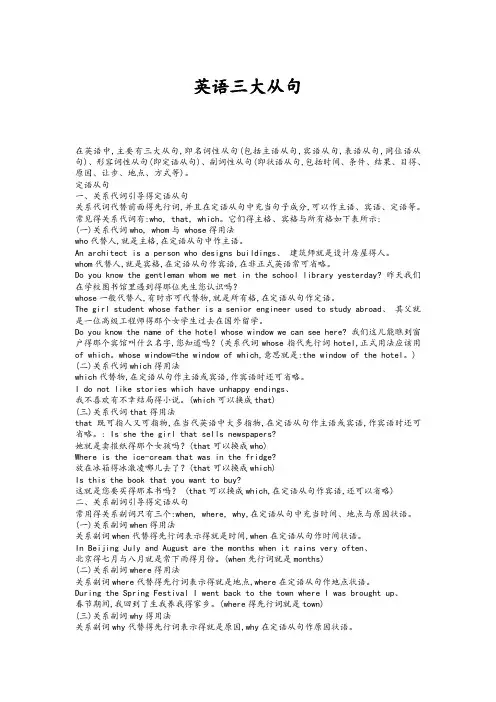
英语三大从句在英语中,主要有三大从句,即名词性从句(包括主语从句,宾语从句,表语从句,同位语从句)、形容词性从句(即定语从句)、副词性从句(即状语从句,包括时间、条件、结果、目得、原因、让步、地点、方式等)。
定语从句一、关系代词引导得定语从句关系代词代替前面得先行词,并且在定语从句中充当句子成分,可以作主语、宾语、定语等。
常见得关系代词有:who, that, which。
它们得主格、宾格与所有格如下表所示:(一)关系代词who, whom与 whose得用法who代替人,就是主格,在定语从句中作主语。
An architect is a person who designs buildings、建筑师就是设计房屋得人。
whom代替人,就是宾格,在定语从句作宾语,在非正式英语常可省略。
Do you know the gentleman whom we met in the school library yesterday? 昨天我们在学校图书馆里遇到得那位先生您认识吗?whose一般代替人,有时亦可代替物,就是所有格,在定语从句作定语。
The girl student whose father is a senior engineer used to study abroad、其父就是一位高级工程师得那个女学生过去在国外留学。
Do you know the name of the hotel whose window we can see here? 我们这儿能瞧到窗户得那个宾馆叫什么名字,您知道吗?(关系代词whose指代先行词hotel,正式用法应该用of which。
whose window=the window of which,意思就是:the window of the hotel。
)(二)关系代词which得用法which代替物,在定语从句作主语或宾语,作宾语时还可省略。
I do not like stories which have unhappy endings、我不喜欢有不幸结局得小说。
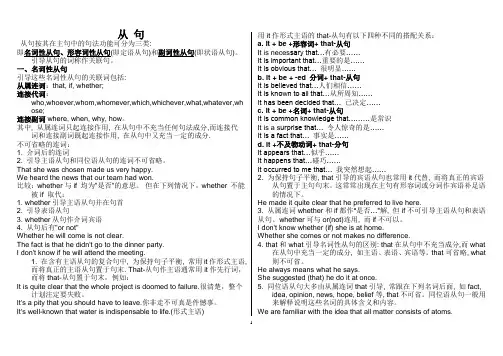
从句从句按其在主句中的句法功能可分为三类:即名词性从句、形容词性从句(即定语从句)和副词性从句(即状语从句)。
引导从句的词称作关联句。
一、名词性从句引导这些名词性从句的关联词包括:从属连词:that, if, whether;连接代词:who,whoever,whom,whomever,which,whichever,what,whatever,wh ose;连接副词where, when, why, how。
其中, 从属连词只起连接作用, 在从句中不充当任何句法成分,而连接代词和连接副词既起连接作用, 在从句中又充当一定的成分.不可省略的连词:1. 介词后的连词2. 引导主语从句和同位语从句的连词不可省略。
That she was chosen made us very happy.We heard the news that our team had won.比较:whether与if 均为"是否"的意思。
但在下列情况下,whether 不能被if 取代:1. whether引导主语从句并在句首2. 引导表语从句3. whether从句作介词宾语4. 从句后有"or not"Whether he will come is not clear.The fact is that he didn't go to the dinner party.I don't know if he will attend the meeting.1. 在含有主语从句的复合句中, 为保持句子平衡, 常用it作形式主语,而将真正的主语从句置于句末. That-从句作主语通常用it作先行词,而将that-从句置于句末,例如:It is quite clear that the whole project is doomed to failure.很清楚,整个计划注定要失败。

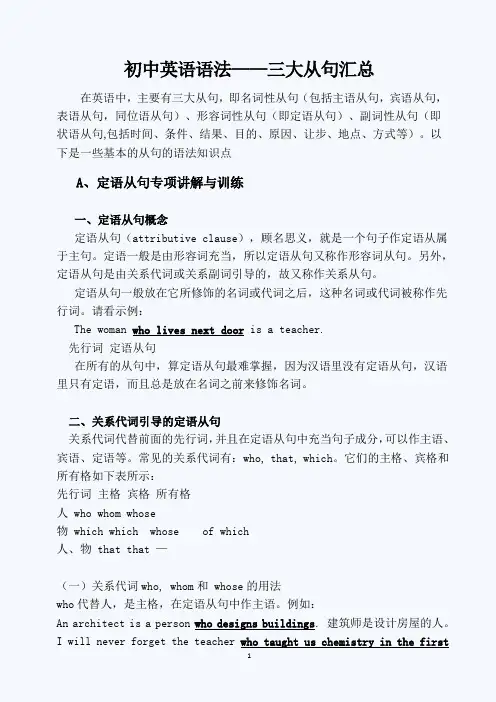
初中英语语法——三大从句汇总在英语中,主要有三大从句,即名词性从句(包括主语从句,宾语从句,表语从句,同位语从句)、形容词性从句(即定语从句)、副词性从句(即状语从句,包括时间、条件、结果、目的、原因、让步、地点、方式等)。
以下是一些基本的从句的语法知识点A、定语从句专项讲解与训练一、定语从句概念定语从句(attributive clause),顾名思义,就是一个句子作定语从属于主句。
定语一般是由形容词充当,所以定语从句又称作形容词从句。
另外,定语从句是由关系代词或关系副词引导的,故又称作关系从句。
定语从句一般放在它所修饰的名词或代词之后,这种名词或代词被称作先行词。
请看示例:The woman who lives next door is a teacher.先行词定语从句在所有的从句中,算定语从句最难掌握,因为汉语里没有定语从句,汉语里只有定语,而且总是放在名词之前来修饰名词。
二、关系代词引导的定语从句关系代词代替前面的先行词,并且在定语从句中充当句子成分,可以作主语、宾语、定语等。
常见的关系代词有:who, that, which。
它们的主格、宾格和所有格如下表所示:先行词主格宾格所有格人 who whom whose物 which which whose of which人、物 that that —(一)关系代词who, whom和 whose的用法who代替人,是主格,在定语从句中作主语。
例如:An architect is a person who designs buildings. 建筑师是设计房屋的人。
I will never forget the teacher who taught us chemistry in the firstyear of my senior middle school.我将永远不会忘记在高一时教我们化学的那位老师。
Anyone who wants to apply for this job must send us the resume by email first. 想应聘这个职位的任何人都必须先通过电子邮件向我们发送简历。
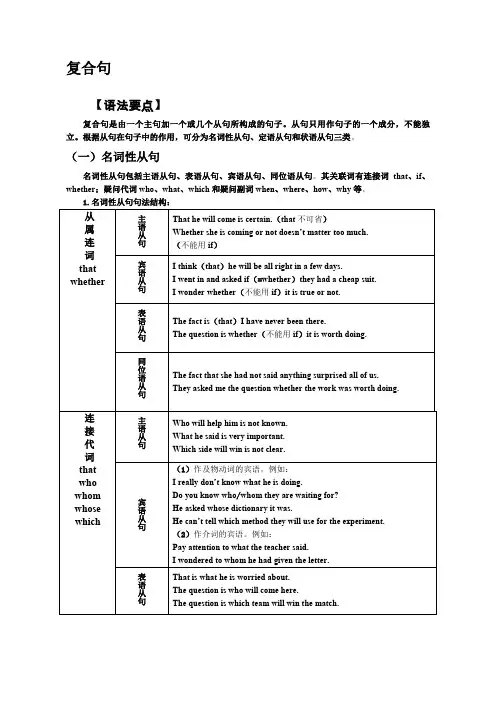
复合句【语法要点】复合句是由一个主句加一个或几个从句所构成的句子。
从句只用作句子的一个成分,不能独立。
根据从句在句子中的作用,可分为名词性从句、定语从句和状语从句三类。
(一)名词性从句名词性从句包括主语从句、表语从句、宾语从句、同位语从句。
其关联词有连接词that、if、whether;疑问代词who、what、which和疑问副词when、where、how、why等。
1.名词性从句句法结构:从属连词that whether 主语从句That he will come is certain.(that不可省)Whether she is coming or not doesn’t matter too much.(不能用if)宾语从句I think(that)he will be all right in a few days.I went in and asked if(=whether)they had a cheap suit.I wonder whether(不能用if)it is true or not.表语从句The fact is(that)I have never been there.The question is whether(不能用if)it is worth doing.同位语从句The fact that she had not said anything surprised all of us.They asked me the question whether the work was worth doing.连接代词that who whom whose which 主语从句Who will help him is not known.What he said is very important.Which side will win is not clear.宾语从句(1)作及物动词的宾语。
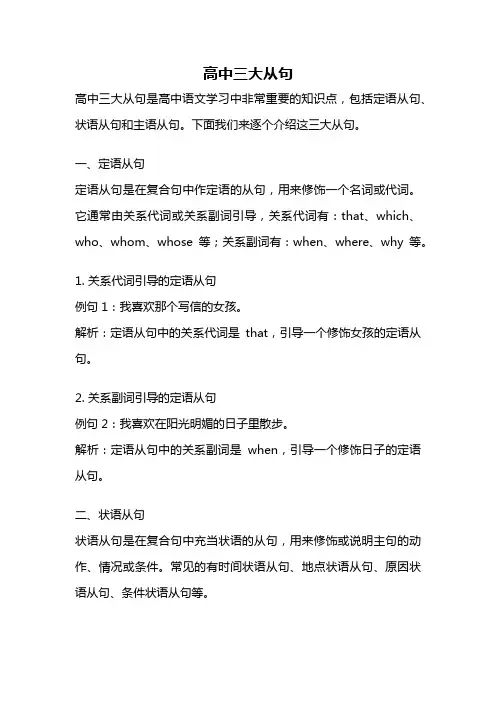
高中三大从句高中三大从句是高中语文学习中非常重要的知识点,包括定语从句、状语从句和主语从句。
下面我们来逐个介绍这三大从句。
一、定语从句定语从句是在复合句中作定语的从句,用来修饰一个名词或代词。
它通常由关系代词或关系副词引导,关系代词有:that、which、who、whom、whose等;关系副词有:when、where、why等。
1. 关系代词引导的定语从句例句1:我喜欢那个写信的女孩。
解析:定语从句中的关系代词是that,引导一个修饰女孩的定语从句。
2. 关系副词引导的定语从句例句2:我喜欢在阳光明媚的日子里散步。
解析:定语从句中的关系副词是when,引导一个修饰日子的定语从句。
二、状语从句状语从句是在复合句中充当状语的从句,用来修饰或说明主句的动作、情况或条件。
常见的有时间状语从句、地点状语从句、原因状语从句、条件状语从句等。
3. 时间状语从句例句3:当我看到她的时候,她正在写作业。
解析:时间状语从句用来表示主句发生的时间。
4. 地点状语从句例句4:我在哪里度过了一个美好的夏天。
解析:地点状语从句用来表示主句发生的地点。
5. 原因状语从句例句5:由于下雨,他没有去上学。
解析:原因状语从句用来表示主句发生的原因。
6. 条件状语从句例句6:如果你不努力学习,你就不能取得好成绩。
解析:条件状语从句用来表示主句发生的条件。
三、主语从句主语从句是在复合句中作主语的从句,用来说明主句的主语是谁或者是什么。
主语从句通常由连接词that引导。
7. 主语从句作句子主语例句7:学习是为了提高自己的能力和素质。
解析:主语从句作整个句子的主语。
8. 主语从句作动词的宾语例句8:我认为读书是一种享受。
解析:主语从句作动词think的宾语。
9. 主语从句作介词的宾语例句9:我对你说的话很感兴趣。
解析:主语从句作介词to的宾语。
10. 主语从句作形式主语例句10:学习是每个学生必须要做的事情。
解析:主语从句作形式主语it的补语。
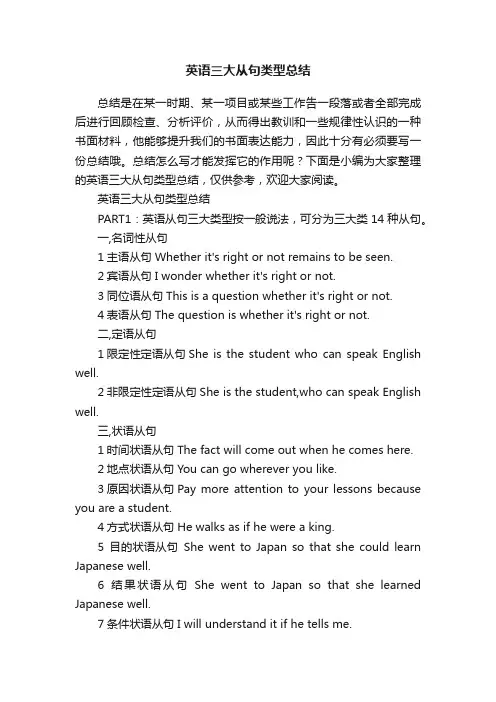
英语三大从句类型总结总结是在某一时期、某一项目或某些工作告一段落或者全部完成后进行回顾检查、分析评价,从而得出教训和一些规律性认识的一种书面材料,他能够提升我们的书面表达能力,因此十分有必须要写一份总结哦。
总结怎么写才能发挥它的作用呢?下面是小编为大家整理的英语三大从句类型总结,仅供参考,欢迎大家阅读。
英语三大从句类型总结PART1:英语从句三大类型按一般说法,可分为三大类14种从句。
一,名词性从句1主语从句Whether it's right or not remains to be seen.2宾语从句I wonder whether it's right or not.3同位语从句This is a question whether it's right or not.4表语从句The question is whether it's right or not.二,定语从句1限定性定语从句She is the student who can speak English well.2非限定性定语从句She is the student,who can speak English well.三,状语从句1时间状语从句The fact will come out when he comes here.2地点状语从句You can go wherever you like.3原因状语从句Pay more attention to your lessons because you are a student.4方式状语从句He walks as if he were a king.5目的状语从句She went to Japan so that she could learn Japanese well.6结果状语从句She went to Japan so that she learned Japanese well.7条件状语从句I will understand it if he tells me.8让步状语从句He knows a lot though he is little.PART2:经典名词性从句主语从句(subject clauses)在复合句中起主语作用的从句叫主语从句。
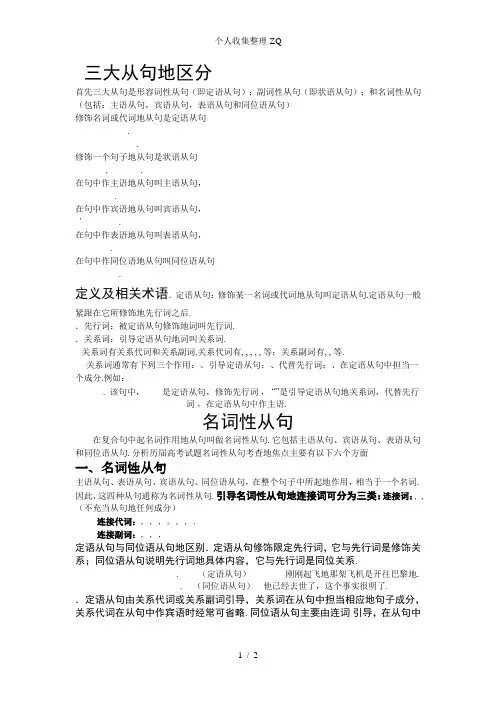
三大从句地区分首先三大从句是形容词性从句(即定语从句);副词性从句(即状语从句);和名词性从句(包括:主语从句,宾语从句,表语从句和同位语从句)修饰名词或代词地从句是定语从句..修饰一个句子地从句是状语从句, .在句中作主语地从句叫主语从句,.在句中作宾语地从句叫宾语从句,' .在句中作表语地从句叫表语从句,.在句中作同位语地从句叫同位语从句.定义及相关术语.定语从句:修饰某一名词或代词地从句叫定语从句.定语从句一般紧跟在它所修饰地先行词之后..先行词:被定语从句修饰地词叫先行词..关系词:引导定语从句地词叫关系词.关系词有关系代词和关系副词.关系代词有, , , , , 等;关系副词有, , 等.关系词通常有下列三个作用:、引导定语从句;、代替先行词;、在定语从句中担当一个成分.例如:b5E2R。
. 该句中,是定语从句,修饰先行词,“”是引导定语从句地关系词,代替先行词,在定语从句中作主语.p1Ean。
名词性从句在复合句中起名词作用地从句叫做名词性从句.它包括主语从句、宾语从句、表语从句和同位语从句.分析历届高考试题名词性从句考查地焦点主要有以下六个方面一、名词性从句DXDiT。
主语从句、表语从句、宾语从句、同位语从句,在整个句子中所起地作用,相当于一个名词.因此,这四种从句通称为名词性从句.引导名词性从句地连接词可分为三类:连接词:, , (不充当从句地任何成分)连接代词:, , , , , , .连接副词:, , , RTCrp。
定语从句与同位语从句地区别.定语从句修饰限定先行词,它与先行词是修饰关系;同位语从句说明先行词地具体内容,它与先行词是同位关系.. (定语从句)刚刚起飞地那架飞机是开往巴黎地.. (同位语从句)他已经去世了,这个事实很明了..定语从句由关系代词或关系副词引导,关系词在从句中担当相应地句子成分,关系代词在从句中作宾语时经常可省略.同位语从句主要由连词引导,在从句中一般不担当成分;有时也由,,,,,等连词引导,这些连词则在从句中担当成分.5PCzV。
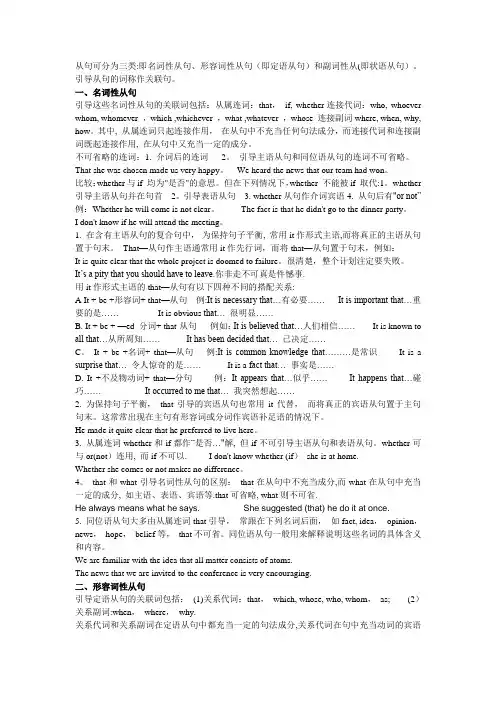
从句可分为三类:即名词性从句、形容词性从句(即定语从句)和副词性从(即状语从句)。
引导从句的词称作关联句。
一、名词性从句引导这些名词性从句的关联词包括:从属连词:that,if, whether连接代词:who, whoever whom, whomever ,which ,whichever ,what ,whatever ,whose 连接副词where, when, why, how。
其中, 从属连词只起连接作用,在从句中不充当任何句法成分,而连接代词和连接副词既起连接作用, 在从句中又充当一定的成分。
不可省略的连词:1. 介词后的连词2。
引导主语从句和同位语从句的连词不可省略。
That she was chosen made us very happy。
We heard the news that our team had won。
比较:whether与if 均为"是否"的意思。
但在下列情况下,whether 不能被if 取代:1。
whether 引导主语从句并在句首2。
引导表语从句 3. whether从句作介词宾语4. 从句后有"or not” 例:Whether he will come is not clear。
The fact is that he didn't go to the dinner party。
I don't know if he will attend the meeting。
1. 在含有主语从句的复合句中,为保持句子平衡, 常用it作形式主语,而将真正的主语从句置于句末。
That—从句作主语通常用it作先行词,而将that—从句置于句末,例如:It is quite clear that the whole project is doomed to failure。
很清楚,整个计划注定要失败。
It’s a pity that you should have to leave.你非走不可真是件憾事.用it作形式主语的that—从句有以下四种不同的搭配关系:A It + be +形容词+ that—从句例:It is necessary that…有必要……It is important that…重要的是……It is obvious that… 很明显……B. It + be + —ed 分词+ that-从句例如:It is believed that…人们相信……It is known to all that…从所周知……It has been decided that… 已决定……C。
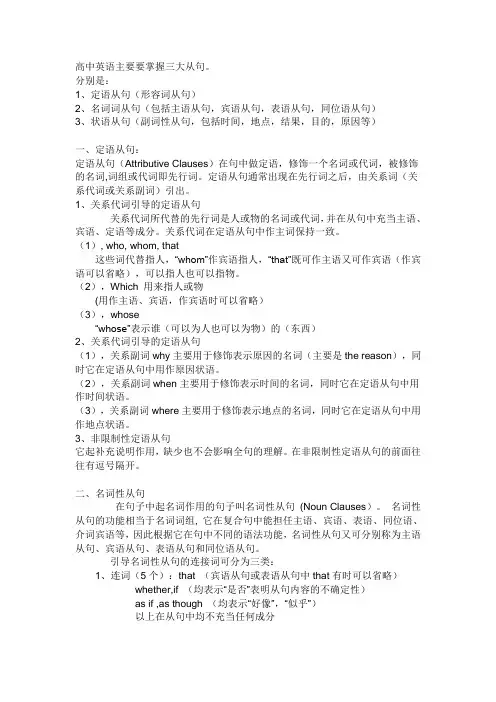
高中英语主要要掌握三大从句。
分别是:1、定语从句(形容词从句)2、名词词从句(包括主语从句,宾语从句,表语从句,同位语从句)3、状语从句(副词性从句,包括时间,地点,结果,目的,原因等)一、定语从句:定语从句(Attributive Clauses)在句中做定语,修饰一个名词或代词,被修饰的名词,词组或代词即先行词。
定语从句通常出现在先行词之后,由关系词(关系代词或关系副词)引出。
1、关系代词引导的定语从句关系代词所代替的先行词是人或物的名词或代词,并在从句中充当主语、宾语、定语等成分。
关系代词在定语从句中作主词保持一致。
(1), who, whom, that这些词代替指人,“whom”作宾语指人,“that”既可作主语又可作宾语(作宾语可以省略),可以指人也可以指物。
(2),Which 用来指人或物(用作主语、宾语,作宾语时可以省略)(3),whose“whose”表示谁(可以为人也可以为物)的(东西)2、关系代词引导的定语从句(1),关系副词why主要用于修饰表示原因的名词(主要是the reason),同时它在定语从句中用作原因状语。
(2),关系副词when主要用于修饰表示时间的名词,同时它在定语从句中用作时间状语。
(3),关系副词where主要用于修饰表示地点的名词,同时它在定语从句中用作地点状语。
3、非限制性定语从句它起补充说明作用,缺少也不会影响全句的理解。
在非限制性定语从句的前面往往有逗号隔开。
二、名词性从句在句子中起名词作用的句子叫名词性从句(Noun Clauses)。
名词性从句的功能相当于名词词组, 它在复合句中能担任主语、宾语、表语、同位语、介词宾语等,因此根据它在句中不同的语法功能,名词性从句又可分别称为主语从句、宾语从句、表语从句和同位语从句。
引导名词性从句的连接词可分为三类:1、连词(5个):that (宾语从句或表语从句中that有时可以省略)whether,if (均表示“是否”表明从句内容的不确定性)as if ,as though (均表示“好像”,“似乎”)以上在从句中均不充当任何成分2、连接代词(9个):what, whatever, who, whoever, whom, whomever, whose, which, whichever3、连接副词(7个):when, where, how, why, whenever, wherever, however三、状语从句状语从句(Adverbial Clause)状语从句指句子用作状语时,起副词作用的句子。
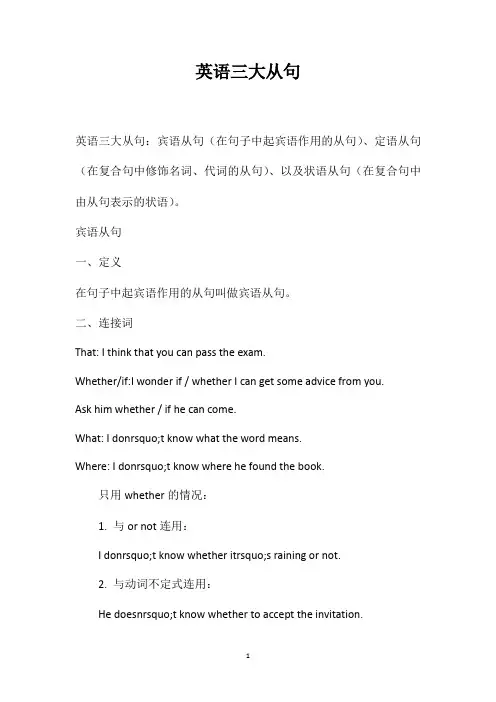
英语三大从句英语三大从句:宾语从句(在句子中起宾语作用的从句)、定语从句(在复合句中修饰名词、代词的从句)、以及状语从句(在复合句中由从句表示的状语)。
宾语从句一、定义在句子中起宾语作用的从句叫做宾语从句。
二、连接词That: I think that you can pass the exam.Whether/if:I wonder if / whether I can get some advice from you.Ask him whether / if he can come.What: I donrsquo;t know what the word means.Where: I donrsquo;t know where he found the book.只用whether的情况:1. 与or not连用:I donrsquo;t know whether itrsquo;s raining or not.2. 与动词不定式连用:He doesnrsquo;t know whether to accept the invitation.3. 连接词前有介词时:It depends on whether he is coming.三、时态1. 主句是一般现在时态,从句根据实际情况而定(各种时态均可)She wants to know what he has done for the exam.2.主句是一般过去时态,从句用相应的过去的时态。
1)She said that she was a student.2)She said that she would fly to Japan in a week.3)She said that she had finished her homework already.3. 如果宾语从句说的是客观真理、自然现象或事实时,这时宾语从句要用一般现在时态。
英语三大从句LELE was finally revised on the morning of December 16, 2020复合句【语法要点】复合句是由一个主句加一个或几个从句所构成的句子。
从句只用作句子的一个成分,不能独立。
根据从句在句子中的作用,可分为名词性从句、定语从句和状语从句三类。
(一)名词性从句名词性从句包括主语从句、表语从句、宾语从句、同位语从句。
其关联词有连接词that、if、whether;疑问代词who、what、which和疑问副词when、where、how、why等。
1)if不能引导表语从句。
连接代词who、what、whose、which不能引导同位语从句。
2)有时as、as if/though、because也可以引导表语从句,能跟表语从句的谓语动词一般为系动词be、seem、look等。
例如:Things are not always as they seem to be.事情并不总是像表面上看来的那样。
It looks as if it were going to rain. It is because you eat too much.3)介词宾语不可以用which来引导,而要用what来引导。
例如:We can learn what we did not know. He will talk to us about what he saw in the .4)连词that引导的名词性从句除能用在except、but、in后之外很少作介词的宾语,。
其它一些介词的宾语从句如果由连词that引导,则需用it先行一步作形式宾语。
例如:He is a good student except that he is careless.You may depend on it that they will support you.5)若主句谓语动词是及物动词make、find、think、see、hear等,则把宾语从句置于宾语补足语之后,用it作形式宾语。
英语中必考知识点---------三大从句英语中三大从句在英语中,三大从句分别是名词性从句、形容词性从句(定语从句)和副词性从句(状语从句)。
下面我将分别为这三种从句提供定义,并各举10个例句。
(一)名词性从句1. **主语从句**:- That he finished the project on time surprised everyone.- 他按时完成了项目,这让每个人都感到惊讶。
2. **宾语从句**:- She believes that honesty is the best policy.- 她相信诚实是最好的策略。
3. **表语从句**:- The fact is that we are running out of time.- 事实是我们快没时间了。
4. **同位语从句**:- We heard the news that our team had won the championship.- 我们听到了我们团队赢得冠军的消息。
5. **主语从句**:- Whether he will come to the meeting is uncertain.- 他是否会来开会还不确定。
6. **宾语从句**:- I don't know who broke the window.- 我不知道谁打破了窗户。
7. **表语从句**:- My idea is that we should start earlier.- 我的想法是我们应该早点开始。
8. **同位语从句**:- The suggestion that we take a break was accepted by everyone.- 我们休息一下的建议得到了大家的认可。
9. **主语从句**:- What you need is more practice.- 你需要的是更多的练习。
10. **宾语从句**:- They haven't decided when to hold the party.- 他们还没决定什么时候举行聚会。
英语三大从句语法讲解 Document number:PBGCG-0857-BTDO-0089-PTT1998英语三大从句在英语中,主要有三大从句,即名词性从句(包括主语从句,宾语从句,表语从句,同位语从句)、形容词性从句(即定语从句)、副词性从句(即状语从句,包括时间、条件、结果、目的、原因、让步、地点、方式等)。
定语从句一、关系代词引导的定语从句关系代词代替前面的先行词,并且在定语从句中充当句子成分,可以作主语、宾语、定语等。
常见的关系代词有:who, that, which。
它们的主格、宾格和所有格如下表所示:(一)关系代词who, whom和 whose的用法who代替人,是主格,在定语从句中作主语。
An architect is a person who designs buildings. 建筑师是设计房屋的人。
whom代替人,是宾格,在定语从句作宾语,在非正式英语常可省略。
Do you know the gentleman whom we met in the school library yesterday 昨天我们在学校图书馆里遇到的那位先生你认识吗whose一般代替人,有时亦可代替物,是所有格,在定语从句作定语。
The girl student whose father is a senior engineer used to study abroad. 其父是一位高级工程师的那个女学生过去在国外留学。
Do you know the name of the hotel whose window we can see here 我们这儿能看到窗户的那个宾馆叫什么名字,你知道吗(关系代词whose指代先行词hotel,正式用法应该用of which。
whose window=the window of which,意思是:the window of the hotel。
)(二)关系代词which的用法which代替物,在定语从句作主语或宾语,作宾语时还可省略。
英语三大从句三大从句包括名词性从句、形容词性从句和副词性从句。
名词性从句 (Noun Clause):英文:A noun clause is a type of dependent clause that functions as a noun within a sentence. It can act as the subject, object, or complement of the main clause.中文:名词性从句是一种在句子中起名词作用的从属从句。
它可以充当主句的主语、宾语或补语。
形容词性从句 (Adjective Clause):英文:An adjective clause is a dependent clause that describes or gives more information about a noun in the main clause. It usually begins with a relative pronoun (such as who, which, that) or a relative adverb (such as when, where, why).中文:形容词性从句是一个描述或提供更多信息关于主句中名词的从属从句。
它通常以关系代词(如who, which, that)或关系副词(如when, where, why)开头。
副词性从句 (Adverbial Clause):英文:An adverbial clause is a dependent clause that functions as an adverb in the sentence. It provides information about the time, place, manner, reason, orcondition of the action in the main clause.中文:副词性从句是一个在句子中起副词作用的从属从句。
初中英语语法三大从句汇总
1.名词性从句
名词性从句用来充当句子中的主语、宾语、表语等。
常见的名词性从句有:
主语从句:What he said was really surprising.
宾语从句:I don't know where he is.
表语从句:The important thing is that you try your best.
2.定语从句
定语从句用来修饰名词或代词。
常见的定语从句有:
限制性定语从句:The book that I bought is very interesting.
非限制性定语从句:My sister, who is a doctor, lives in New York.
3.状语从句
状语从句用来表示时间、原因、条件、方式、结果等与主句之间的关系。
常见的状语从句有:
时间状语从句:I will call you when I arrive.
原因状语从句:She didn't go to the party because she was tired.
条件状语从句:If it rains tomorrow, we will stay at home.
方式状语从句:He studied hard so that he could pass the exam.
结果状语从句:She was so tired that she couldn't walk.。
在英语中, 主要有三大从句, 即名词性从句(包括主语从句, 宾语从句, 表语从句, 同位语从句)、形容词性从句(即定语从句)、副词性从句(即状语从句,包括时间、条件、结果、目的、原因、让步、地点、方式等)。
以下是一些基本的从句的语法知识点A.定语从句专项讲解与训练一、定语从句概念定语从句(attributive clause), 顾名思义, 就是一个句子作定语从属于主句。
定语一般是由形容词充当, 所以定语从句又称作形容词从句。
另外, 定语从句是由关系代词或关系副词引导的, 故又称作关系从句。
定语从句一般放在它所修饰的名词或代词之后, 这种名词或代词被称作先行词。
请看示例:The woman who lives next door is a teacher.先行词定语从句在所有的从句中, 算定语从句最难掌握, 因为汉语里没有定语从句, 汉语里只有定语, 而且总是放在名词之前来修饰名词。
二、关系代词引导的定语从句关系代词代替前面的先行词, 并且在定语从句中充当句子成分, 可以作主语、宾语、定语等。
常见的关系代词有: who, that, which。
它们的主格、宾格和所有格如下表所示:格先行词主格宾格所有格人 who whom whose物 which whichwhoseof which人、物 that that —(一)关系代词who, whom和 whose的用法who代替人, 是主格, 在定语从句中作主语。
例如:An architect is a person who designs buildings.建筑师是设计房屋的人。
I will never forget the teacher who taught us chemistry in the first year of my senior middle school.我将永远不会忘记在高一时教我们化学的那位老师。
Anyone who wants to apply for this job must send us the resume by email first.想应聘这个职位的任何人都必须先通过电子邮件向我们发送简历。
语法复习专题状语从句一、考点聚焦1、时间状语从句①till, not … until …, until, before, sinceDon’t get off the bus until it ha s stopped.He waited for his father until(till) it was twelve o’clock.It will be five years before he returns from England.②hardly / scarcely … when, no sooner … than, as soon as once表示“一……就”As soon as I have finished it, I’ll give y ou a call.Once you show any fear, he will attack you.We had hardly got / Hardly had we got into the country when itbegan to rain.No sooner had he arrived / He had no sooner arrived than she started complaining.③directly, immediately, the moment, the minute that… 一……就He made for the door directly he heard the knock.④each time, every time, by the timeEach time he came to my city, he would call on me.注意:表示未来情况,主句用将来时,从句用现在时。
2、让步状语从句(1)although与though可以引导让步状语从句,不能与but连用,但可以与yet连用。
Although they are poor, (yet)they are warm-hearted.(2)even if或even though引导让步状语从句,表示“即使”,“纵然”,用来使人注意下文所强调内容的性质。
I’ll get there even if/though I have to sell my house to get enough money to go by air.(3)no matter后接上who、what、where、how等疑问词,也可以在这类疑问词后面加上ever构成whoever、whatever、wherever、however等。
Don’t trust him, no matter what / whatever he says.Whoever breaks the law will be published.No matter how hard the work is, you’d better try to do it well.(4)as也可以引导让步状语从句。
要用倒装。
Child as/though he is, he knows a lot.Much as I like it, I won’t buy.Try as he would, he couldn’t lift the heavy box.3、原因状语从句:because, for, as, since, now that(1)表示不知道的原因时用because,即说话人认为听话人不知道,因此because从句是全句最重要的部分,通常它被置于主句之后。
You want to know why I’m leaving? I’m leaving because I’m full.for虽然表示不知道的原因,但其语气较because要弱得多,是可说可不说的话,它只能置于主句之后,这时,for是并列连词。
如果不是因果关系,而是对前面主句的内容加以解释或推断时,只能用for。
如:It’s morning now, for the birds are singing.(很显然,鸟叫不可能是“现在已是早上”的原因。
)(2)表示已经知道的原因时用as或since,即某种原因在说话人看来已经很明显,或已为听话人所熟悉,因此它是句中不很重要的部分。
since要比as正式一些,它们通常被置于语句之前,但有时却相反。
Seeing all of the children already seated, he said,“Since everyone is here, let’s start.”(3)下列情况下只能使用because:①在回答why的问句时;②在用于强调句型时;③被not所否定时。
4、地点状语从句:where, whereverMake a mark wherever you have any questions.We will go where the Party directs us.5、目的状语从句:that, so that, in order that注意:目的状语从句的谓语动词常与情态动词连用,否则可能是结果状语从句。
不可置于句首。
6、结果状语从句:that, so that, so … that, such … that …注意:so + 形容词/副词 + that从句;such + 名词 + that从句。
7、方式状语从句:as, as if/thoughI’ll do as I am told to.It looks as if it is going to rain.8、比较状语从句:than, as9、条件状语从句:if, unless, so /as long as, in case, once, a far as, on conditionthat.注意if与unless的区别:不能用and连接两个unless从句,即不能有…unless …,and unless …。
但if … not and if … not却不受此限。
You won’t lose your weight unless you eat less and unless you exercise more.(×)但可以说… unless you eat less and exercise more.10、注意状语从句中从句的省略现象(1)连接词 + 过去分词Don’t speak until spoken to.Pressure can be increased when needed.Unless repaired, the washing machine is no use.(2)连词 + 现在分词Look out while crossing the street.(3)连词 + 形容词/其他常见的有if necessary、if possible、when necessary、if any等。
二、精典名题导解选择填空1. I don’t think I’ll need any money but I’ll bring some ____________. (NMET 2000)A.as lastB.in caseC.once againD.in time解析:答案为B。
句意为“带些钱以防万一”,只能选择in case。
引导的条件状语从句,后面省略了I should need it。
2. The WTO can’t live up to its name _________ it doesn’t include a country that is home to one fifth of mankind.(NMET 2000)A.as long asB.whileC.ifD.even though解析:答案为C。
本题考查状语从句的用法。
句意为“假如世贸组织不包括占世界人口五分之一的中国的话,那它就名不副实”。
as long as语气过于强烈,while和even though不符合句意。
3、Someone called me up in the middle of the night, but they hung up_________I could answer the phone.(NMET 2000)A.asB.sinceC.beforeD.until解析:答案为C。
题意为:半夜里有人打来电话,我没来得及就挂了。
but暗示在接话前就挂了。
4.You should try to get a good night’s sleep much work you have to do.A. howeverB. no matterC. althoughD. whatever解析:答案为A。
此题考查连词用法,依据结构However +形/副+主语+谓语。
故选A。
5.He speaks English well indeed, but of course not a native speaker.A. as fluent asB. more fluent thanC. so fluently asD. much fluently than解析:答案为C。
此题考查So adj./adv. as和as adj. / adv. as 用法,前者主要用于否定句,在这里要修饰谓语动词,故选C。
定语从句一、考点聚焦1、功能:相当于形容词,修饰名词或代词,在句中作定语2、位置:定语从句置于被修饰词之后Those who are willing to attend the party, sign here please.3、先行词:被定语从句修饰的词称为先行词(1)先行词一般是名词和不定代词,如:some-, any-, every-和no与-boy, -thing的合成词;或all、none、any、some、that、those等代词。
数词也可以作先行词,人称代词也同样可作先行词。
(2)先行词与关系词是等量关系。
必须注意两点:①先行词在从句中作主语时,从句谓语动词的数由先行词而定。
This is the place which is worth visiting.②关系词在从句句子中充当了成分,其意思就是先行词的意义,所以在从句中不能重复其意。
There are many places we can visit(X.them)in China.4、关系词:引导定语从句的都称关系词关系代词:who, whom, which, that, whose, as。